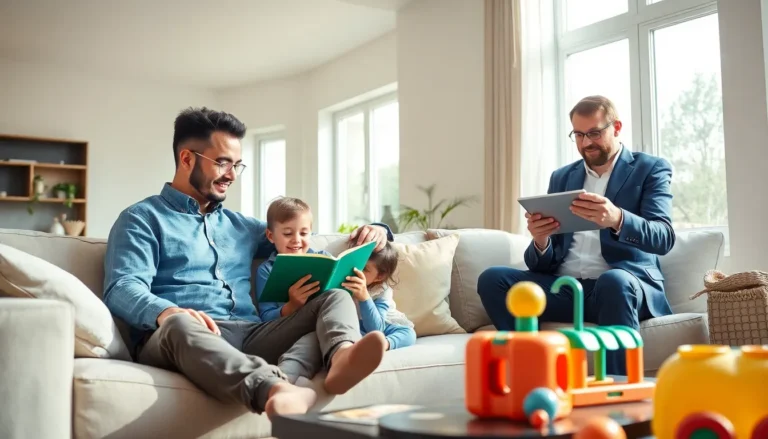Table of Contents
ToggleNavigating the maze of parenting can feel like wandering in a never-ending corn field. You may have heard the terms solo and single parenting tossed around like confetti at a parade. But what’s the actual difference between the two? Buckle up, because this isn’t just a typical parenting discussion. Understanding these distinctions not only clears the fog but also celebrates the uniqueness of each parenting style. As they say, knowledge is power, even when it comes to parenting, where it sometimes feels like you’re merely powering through.
Understanding Parenting Styles

Parenting styles have evolved over the years, influenced by social dynamics, culture, and individual family situations. While you may think every parent follows the same path, the truth is that there are many roads to roam. Generally, these styles can be categorized into various frameworks, but they can easily be shaped by personal circumstances. Solo parenting and single parenting both fall under the larger umbrella of non-traditional family structures, each equipped with its own set of nuances.
The Rise of Diverse Family Models
With contemporary shifts in societal norms and values, the archetype of a family has broadened to embrace all kinds of relationships. Individuals choose different paths for a plethora of reasons, be it love, separation, or by choice, all contributing to the rich tapestry of parenting styles today.
Defining Solo Parenting
Solo parenting describes a situation where one parent assumes the primary responsibility for raising a child without regular involvement from a partner. This model isn’t always born from necessity: some individuals choose this path intentionally, creating a stable and loving environment on their own. A solo parent sets the course for day-to-day decisions, leading and teaching their children without the backdrop of a co-parent.
It’s crucial to note that solo parents often rely on a network of friends and extended family for support, which plays a critical role in ensuring that the parenting journey is not undertaken in complete isolation.
Defining Single Parenting
In contrast, single parenting generally refers to situations where an individual is raising children independently, often after a separation or divorce. The key factor here can be the absence of a romantic partner, but this doesn’t reduce the parenting duties. A single parent often finds themselves navigating a world filled with shared responsibilities, whether through co-parenting or sometimes a lack of support from the other parent.
While single parents may still have occasional input from the other parent, they often bear the brunt of daily responsibilities and decisions. This can lead to unique challenges and adjustments, particularly about communication and logistical coordination.
Key Differences Between Solo And Single Parenting
Understanding the distinctions between solo and single parenting can help clarify expectations and strategies for success. While both involve taking care of children alone, they differ fundamentally in various aspects.
Social Support Systems
In solo parenting, there is often more emphasis on cultivating social networks for encouragement and assistance. Friends, family, and community organizations often step in to fill any gaps, providing emotional and logistical support.
On the other hand, single parents might find themselves toggling between cooperation and conflict with an ex-partner, making social networks more complex. Sometimes, navigating these relationships can lead to additional pressures, like feeling torn between co-parenting obligations and personal resentment.
Emotional Responsibilities
Solo parents tend to take on all emotional responsibilities as the primary caregiver, directly shaping their child’s upbringing. This model can create a strong bond, but also may lead to feelings of isolation if not adequately supported by a broader social structure.
Conversely, a single parent experiences emotional responsibilities that can be shared, albeit imperfectly, with the child’s other parent. This might create emotional conflicts but can also help opportunities for growth, communication, and shared parenting experiences.
Financial Considerations
Financial stability is another difference between the two. Solo parents typically manage the entire financial landscape on their own. From budgeting for groceries to planning for future expenses, these duties often fall solely on their shoulders.
In contrast, single parents may have some form of shared financial responsibilities or incentives. They may benefit from child support, which can ease financial pressures, although fluctuations in payments can create added stress.
Impact On Children
Children raised in single and solo parenting environments can have varied experiences, influenced largely by the parenting style.
Studies suggest that children in solo parenting situations often develop strong independence and adaptability, learning to cope with challenges head-on. But, they might struggle with feelings of isolation if community support isn’t robust.
For children with single parents, exposure to shared parenting dynamics can provide them with insights into relationships, conflict resolution, and (potentially) resilience during family transitions. Each child’s experience will differ based on the emotional intelligence and stability offered by their parent, regardless of the circumstances.
Common Challenges Faced
Both solo and single parents face their own unique set of challenges that can test their resilience and resolve. From juggling work-life balance to dealing with emotional exhaustion, the journey can be rocky. Solo parents often find themselves battling feelings of loneliness, as they attempt to do it all while managing day-to-day living.
On the flip side, single parents often navigate the murky waters of co-parenting arrangements. This can include differences in parenting styles, communication barriers, and scheduling dilemmas. The expectations can lead to conflicts that spill over into their parenting journey.
Resources And Support For Parents
Luckily, both solo and single parents can tap into numerous resources tailored to their unique experiences. Online forums and local support groups can provide a network of individuals feeling the same parenting pangs. Resource centers focusing on parenting often offer workshops and guidance tailored for these specific scenarios, facilitating skills development and emotional support.
Also, counseling and mentoring programs can help parents deal with the psychological aspects of raising children alone. Whether through online webinars or local meet-ups, these resources can bridge the gaps that solo and single parents might encounter.





